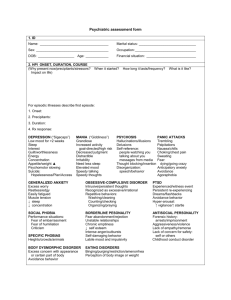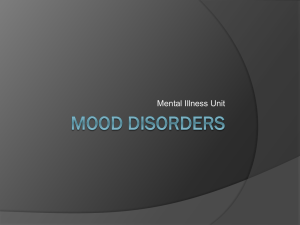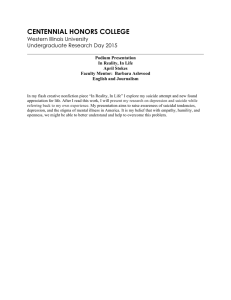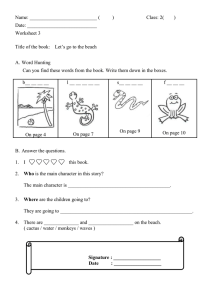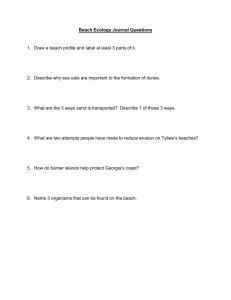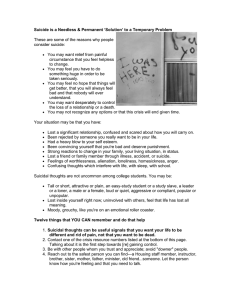Suicide Assessment Tool
advertisement
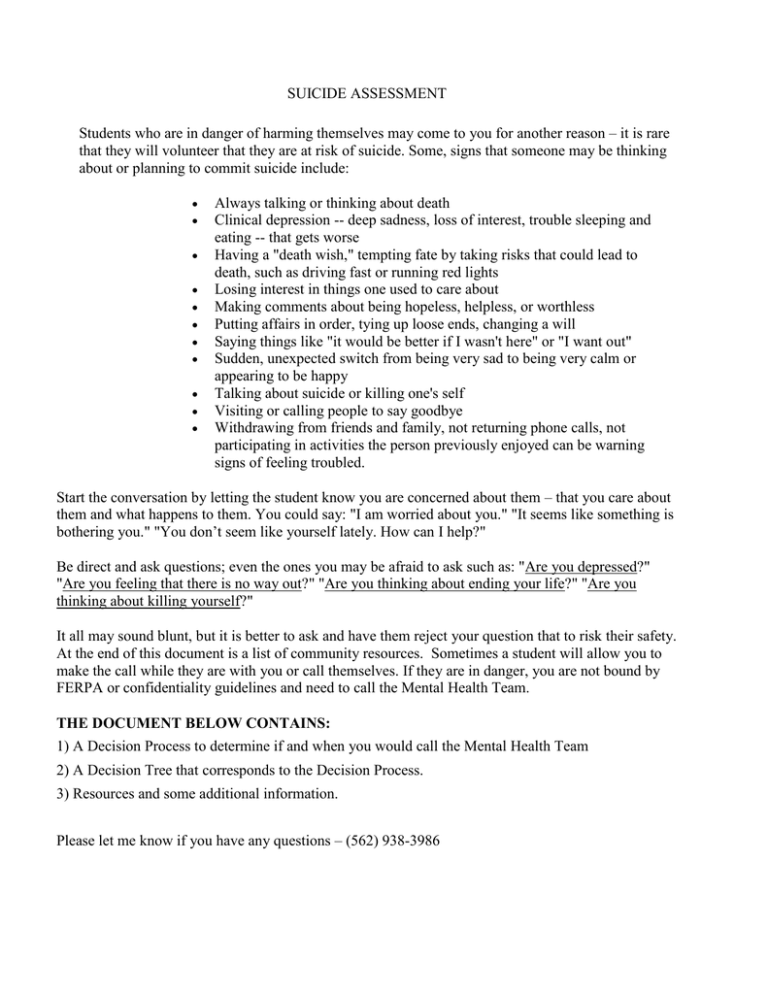
SUICIDE ASSESSMENT Students who are in danger of harming themselves may come to you for another reason – it is rare that they will volunteer that they are at risk of suicide. Some, signs that someone may be thinking about or planning to commit suicide include: Always talking or thinking about death Clinical depression -- deep sadness, loss of interest, trouble sleeping and eating -- that gets worse Having a "death wish," tempting fate by taking risks that could lead to death, such as driving fast or running red lights Losing interest in things one used to care about Making comments about being hopeless, helpless, or worthless Putting affairs in order, tying up loose ends, changing a will Saying things like "it would be better if I wasn't here" or "I want out" Sudden, unexpected switch from being very sad to being very calm or appearing to be happy Talking about suicide or killing one's self Visiting or calling people to say goodbye Withdrawing from friends and family, not returning phone calls, not participating in activities the person previously enjoyed can be warning signs of feeling troubled. Start the conversation by letting the student know you are concerned about them – that you care about them and what happens to them. You could say: "I am worried about you." "It seems like something is bothering you." "You don’t seem like yourself lately. How can I help?" Be direct and ask questions; even the ones you may be afraid to ask such as: "Are you depressed?" "Are you feeling that there is no way out?" "Are you thinking about ending your life?" "Are you thinking about killing yourself?" It all may sound blunt, but it is better to ask and have them reject your question that to risk their safety. At the end of this document is a list of community resources. Sometimes a student will allow you to make the call while they are with you or call themselves. If they are in danger, you are not bound by FERPA or confidentiality guidelines and need to call the Mental Health Team. THE DOCUMENT BELOW CONTAINS: 1) A Decision Process to determine if and when you would call the Mental Health Team 2) A Decision Tree that corresponds to the Decision Process. 3) Resources and some additional information. Please let me know if you have any questions – (562) 938-3986 DECISION PROCESS Step 1) Has the student done something to indicated that they have made an attempt to hurt/kill themselves recently? a. If yes, contact the LB Mental Health Evaluation Team (MET) at (562) 435-6711 or 911 Step 2) If you do not know, begin with an initial screening (STEP 3) to assess thought, plan and intent. Below are some questions you can use to begin the conversation to help the student feel comfortable and establish rapport. a) How is your day going? This week? Anything unusual? b) Has anything happened recently that is bothering you? c) How have you been doing in school? At home? d) How are you feeling right now? e) How do you feel most of the time? <Establish an overall mood or time when depressed mood started> f) I want to talk with you because <describe the concern and reason for the referral> Step 3) Ask: Are you thinking about, or have you thought about hurting or killing yourself? a. b. Step 4) If NO, talk about counseling to help the student feel better, or do better in school. If YES, proceed to step 4 Ask: Do you have a plan? a. b. If NO, talk about counseling to help the student feel better, or do better in school. If YES, gather the following information AND contact: LB Mental Health Evaluation Team (MET) at Dispatch: (562) 435-6711 or 911 c. Explore as many of the following as possible. (The more information you can give to the MET team the easier it will be to help them) 1. Description of a plan, method? 2. How long have they been thinking of hurting or killing themself? 3. How often do they think of hurting or killing themself? 4. Can they get rid of these thoughts or stop them if they try? 5. Was there an event that started these thoughts: Relationship ended, death, traumatic event. 6. When do they have these thoughts? 7. Were there attempts? When, where, how? Hospitalized (when, where)? 8. Has any family member or someone close to you ever tried to kill themselves? Step 5) Ask: Is there intent? - How serious do you think they are about hurting/killing themselves? a. If NO, you still contact: LB Mental Health Evaluation Team (MET) at Dispatch: (562) 435-6711 or 911 b. If YES, a) Determine if they have the means available to them (do they have guns, knives, pills, car). b) Have they had time to prepare (pills, obtain a gun, practiced, said good-bye to friends, written note, given away gifts/possessions) DECISION TREE STEP 3: Do they ackno wledge they are having suicida l though ts? N O Discuss concerns and provide referral to Psycholo gical Services: 938-3987 Y E S STEP 4: STEP 5: Do they describe a plan for suicide? Is there evidence of Suicidal Intent? Have they prepared to N follow O through? Discuss: 1. Concerns , 2. Whether they are willing to enter hospital treatment voluntaril y (see referral list) 3. Provide referrals to Contact LB Psycholo Mental gical Health Services: Evaluation 938-3987 Team (MET) and at (562) 435Suicide 6711 or 911 Hotline, 1-8777CRISIS (1-877727-4747) N O s Discuss: 1. Concerns, 2. Whether they are willing to enter hospital treatment voluntarily (see referral list) 3. Provide referrals to Psychologi cal Services: 938-3987 and Suicide Hotline, 1-8777CRISIS (1-877727-4747) Y E S Contact LB Mental Health Evaluati on Team (MET) at (562) 4356711 or 911 Y E S RESOURCES AGENCY La Casa Mental Health Center of Long Beach CA INFO 6060 North Paramount Boulevard, Long Beach, CA 90805 (562) 634-9534 College Hospital College Hospital Cerritos 10802 College Place Cerritos, CA 90703 (562) 924-9581 Mental Health American – Los Angeles – also known as “The Village” 456 Elm Ave Long Beach, CA 9:00 a.m. to 2:00 p.m. Mondays, Tuesdays, Thursdays & Fridays 10:00 a.m. to 1:00 p.m. Wednesdays 1000 West Carson Street Torrance, CA 90502-2004 (310) 222–2345 Drop-in Center Los Angeles County-HarborUCLA Medical Center REFERING CRITERIA Student has no medical insurance Student reports steady debilitating symptoms to the point that his/her grades, attendance or ability to relate to peers/teachers is being affected. Student reports they have taken psych meds in the past but no longer has a prescribing psychiatrist to get their refill due to no insurance. This facility will provide: Medical evaluation by a psychiatrist Will take students without medical insurance will prescribe and give free meds for one month if needed Student reports suicidal thoughts with a plan but no intent to follow thru. Student agrees to hospitalization and is safe to be driven to the hospital by self or someone else. Student reports history of serious suicide attempts and is currently struggling with suicidal ideation. Will require student to have an insurance plan but on emergency basis, will not need insurance to be admitted Individualized services to persons without access to other services, who are homeless, have mental illness and need to be connected to longer-term homeless and mental health services. Student has no medical insurance and has already been seen at Long Beach Mental Health and will need on-going psychiatric medical treatment. Student has been recently diagnosed or has an extensive history of a psychiatric illness such as but not limited to Major Depressive Disorder, Bipolar, Schizophrenia, Panic Disorder, Generalized Anxiety D/O, OCD etc. and Student may be connected to services and resources such as medical or Medicaid if deemed appropriate. The Trevor Hotline (866) 488-7386 Info Line 211 Family Service Long Beach 5500 E Atherton St # 416 Long Beach, CA 90815 (562) 493-1496 Substance Abuse Foundation of Long Beach 3125 E. 7th St., Long Beach, CA 90804 PH: (562) 439-7755 TTY: (800) 735-2929 New Hope Grief Support Community 3443 San Anseline Long Beach, CA 90808 Our House (Grief Recovery) (310) 475-0299 Flossie Lewis 351 E. 6th St., Long Beach, CA 90802 PH: (562) 435-7350 24 hours Crisis (800) 352-3301 Help lines (800) 784-2433 Open 24 hours a (800) 273-8255 day 365 day of the year California (800) 843-5200 Youth Crisis Line Emergency Psychiatric (800) 854-7771 The Trevor Project is the leading national organization providing crisis intervention and suicide prevention services to lesbian, gay, bisexual, transgender, and questioning youth. Student has no medical insurance and for sure will need ongoing psychiatric medical treatment. Student does not meet income criteria for government program. Student has the means to pay cash since this agency provides sliding scale. Student has being diagnosed or has an extensive history of a psychiatric illness such as but not limited to Major Depressive Disorder, Bipolar, Schizophrenia, Panic Disorder, General Anxiety Disorder, Anxiety disorder, OCD etc. and www.safinc.org Adult outpatient/residential substance abuse treatment; classes in anger management, domestic violence and parenting. Spanish spoken. FEE: Medi-Cal, sliding scale. HRS: Monday-Friday 8 AM-5 PM. http://www.newhopegrief.org/contactus/#sthash.hIKbyGzH.dpuf Residential substance abuse treatment for women ages 18-65. FEE: Sliding scale, indigent beds. FREE!!! Extra resource for students to talk to somebody when they are having suicidal thoughts without an intent or plan. Resources for Families and Friends After a Suicide Attempt or Threat Services (DMH) Suicide Prevention and 877) 727-4747 Survivor Hotline Teen Line Research Clinic (800) 852-8336 3151 Airway Av, Suite T3 Costa Mesa, CA 90262 (714) 545-5550 Private Insurance Varies Student has no medical insurance, and will need on-going psychiatric medical treatment. Student has been recently diagnosed or has an extensive history of a psychiatric illness such as, but not limited to, Major Depressive Disorder, Bipolar, Schizophrenia, Panic Disorder, Generalized Anxiety D/O, OCD etc. Student may qualify for a clinical study where he/she could potentially get free meds as well as a free psych evaluation. No insurance required and if qualify for the study will get free meds and on-going treatment for the duration of the study. Student has private insurance and has been recently diagnosed or has an extensive history of a psychiatric illness such as, but not limited, to Major Depressive Disorder, Bipolar, Schizophrenia, Panic Disorder, Generalized Anxiety D/O OCD etc. and/or ongoing psychotherapy
